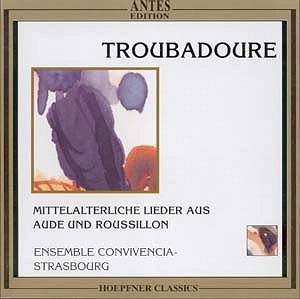TROUBADORE
Troubadour songs of Aude and Roussillon |
Manuscrit La Clayette
Motette. Onques níama / Molt míabellist / Flos filius
[1.06]
Peire Raimon de Tolosa
Pessamen ai e cossir [3.04]
Manuscrit de Paris
Tierche estampie rÈaI [2.39]
Raimon de Miraval
Ar ab Ia forsa del freis [8.31]
Chansoneta farai vencut [4.15]
Manuscrit de Paris
Quinte estampie rÈaI [1.09]
Handschrift Wolfenbuttel 2
Motette. El cor ai uní alegransa
[1.35]
Pans díOrtafa
Si ai perdut mon saber [5.56] |
 |
Handschrift Wolfenbuttel 2
Motette. El cor ai uní alegransa
[1.35]
Pans díOrtafa
Si ai perdut mon saber [5.56]
Guiraut Riquier
Car drechs ni fes [10.35]
Manuscrit de Paris
Quarte estampie [2.14]
Guiraut Riquier
Jesus Christ [7.30]
Handschriff Wolfenbuttel 2
Motette. Líaltrier cuidai aber druda [1.31] |
Manuscrit de Paris
Seconde estampie rÈaI [2.34]
Guiraut Riquier
Si chants me pogues valensa [7.50]
Manuscrit de Paris
UitiËme estampie rÈaI [2.00]
Mariuscrit de Montpellier
Motette. Li jalous / Tout cii / Veritatem
[1.09]
Berenguer de Palau
Tant míabelis jois et amors e chants [4.24] |
 Ensemble
Convivencia Ensemble
Convivencia
Rec: no details given?
 ANTES EDITION BM-CD 3.9041
[69.11] ANTES EDITION BM-CD 3.9041
[69.11]
|
In southern France, in the 11th and 12th centuries, a new musical form was
born. It coincided with several major social upheavals - close contacts with
the Arab empire; a new social structure; the development of a feeling called
'courtly love'; and the development of the travelling minstrel or troubadour.
These troubadours travelled throughout Europe and brought their music, with
its many influences, to the courts of nobles everywhere. As entertainment
at celebrations, fairs and markets, this music also reached the broader
population. For the first time, a new musical form was born that was divorced
from the purely secular concerns of previous music. Songs about love, hunting,
drinking and the like developed and spread all over Europe.
This recording gives an overview of some of the most important forms of
troubadour music from this period. Oddly enough, the influence of this type
of music can even be seen today. Si ai perdut mon saber is a plaintive
song with a simple accompaniment to a male voice, singing a simple, repetitive
melody. A lute plays a Spanish-sounding chord progression, and, over that,
a cornet floats over and around the voice with a sound and presence that
Jan Gabarek, a jazz saxophonist, often uses.
Some of the pieces have a decidedly oriental feel to them - some bear a
middle-eastern influence, such as Tierche Estampie réal, an
instrumental piece for several instruments, where the rhythm clearly shows
the interrelationship between Arabic and French cultures at the time. Others,
such as Quinte estampie real, sound almost Indian. This is a brief
lute and percussion piece that has the characteristics of many Indian works
for sitar and percussion.
Still others are descendants of the plainchant tradition. Jesus Christ
recalls the works of Hildegard de Bingen - a single, female voice weaves
arabesques of melody over an essentially droning background (of a small,
portable organ) that progresses slowly through simple modulations. This type
of music turns back the clock, transporting the listener to another time.
Friederike Schulz's soprano voice sounds almost magical in this piece, as
it does in the other songs she sings.
Most interesting are the few longer pieces, songs between 7 and 10 minutes
long. As in the song Jesus Christ, the pieces Car drechs ni fer
and Si chants me pogues valens feature the irresistible voice
of Friederike Schulz singing alone over slow, simple, melancholy accompaniment.
All in all, this is a curious recording, an interesting collection of works
from the 12th and 13th centuries in southern France. This is definitely worth
having for all those interested in this era of music, as well as for the
quality of the performances, especially the almost mystical singing of Friederike
Schulz. Today's listeners, unfamiliar with early music, will find a new-age
feeling in many of these works - a slow, meditative type of music that is
relaxing and poignant.
Kirk McElhearn
CONTACT DETAILS
Bella Musica Edition
distribution@bellamusica.de
Bella Musica Edition (Antes Edition)
Eisenbahnstr. 30
D- 77815 BÜHL
Telephone: +49 (0)7223-98550
Telefax: +49 (0)7223-985566

